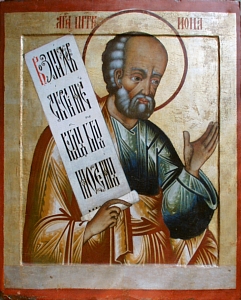Encountering the Prodigal Son in Jonah
A Reading by Lee Magness

When you are studying the Parable of the Prodigal Son, even when you are thinking about Old Testament parallels to the Prodigal Son, the story of the prophet Jonah is not exactly the first story that springs to mind. But the parallels are there. And our understanding of each story is enriched by reading it in the light of the other. You might already be objecting--Jonah is about the relationship between God and one prophet, while the parable is about a father and two sons. But, as the retelling below suggests, Jonah functions as both the younger and the elder son.
1) Read the short book of Jonah. Reflect on the actions and motivations of the prophet and his relationship with God and the people he contacts in his travels. Make some notes on and discuss your observations.
2) Read Luke 15.11-32. Reflect on the characters of the father and his sons, especially their relationships. Make notes on your reflections and on the parallels you observe between the two texts. If you are working in a group, discuss the parallels you observed and how the prophetic book and the parable illuminate each other.
3) Read (out loud, if you are working in a group) the retelling below--several times if you wish. Identify parallels you had already noticed and ones you had not.
4) Write an encounter essay on the interpenetration of the Prophet and the Parable and how they inter-interpret each other.
THE PARABLE OF THE PRODIGAL JONAHS
Retold by Lee Magness
Once God had two prophets. The one prophet, named Jonah, said to God, “I refuse to obey you by going to preach repentance to the people of Nineveh!” And not many days later he got on a boat and sailed off toward a far country. And there he wasted his opportunity to prophesy to the pagan sailors and hunkered down in the hold of the ship.
And when he had squandered this great opportunity, a terrible storm arose, and they began to be in fear for their lives. When Jonah told them that he was fleeing from the presence of the Lord, they threw him into the raging sea.
But when he came to himself in the depths of the sea, he began to pray, “My life is ebbing away, O Lord. I remember you and my prayer comes to you. I will give a sacrifice of thanksgiving to you. Deliverance belongs to you, O Lord.” So the sea rose up and dropped him on dry land.
Now the word of the Lord came to another prophet, a new Jonah: “Get up and go to Nineveh and tell them to repent.” This time Jonah, the other Jonah, was obedient. He went to the field, to Nineveh, and called them to repentance before God. And they repented. And God was thrilled.
But Jonah, the new Jonah, responsible, obedient, cooperative Jonah, got angry. He was furious that God would show compassion and mercy toward those sinners. He wouldn’t go in to celebrate. Instead he went outside the city and sat down to watch what would happen, still in hopes that God would punish the people of Nineveh.
So God went out to Jonah and said, “Why are you so angry? Don’t you share my concern and compassion for all these lost people?
Retold by Lee Magness
Once God had two prophets. The one prophet, named Jonah, said to God, “I refuse to obey you by going to preach repentance to the people of Nineveh!” And not many days later he got on a boat and sailed off toward a far country. And there he wasted his opportunity to prophesy to the pagan sailors and hunkered down in the hold of the ship.
And when he had squandered this great opportunity, a terrible storm arose, and they began to be in fear for their lives. When Jonah told them that he was fleeing from the presence of the Lord, they threw him into the raging sea.
But when he came to himself in the depths of the sea, he began to pray, “My life is ebbing away, O Lord. I remember you and my prayer comes to you. I will give a sacrifice of thanksgiving to you. Deliverance belongs to you, O Lord.” So the sea rose up and dropped him on dry land.
Now the word of the Lord came to another prophet, a new Jonah: “Get up and go to Nineveh and tell them to repent.” This time Jonah, the other Jonah, was obedient. He went to the field, to Nineveh, and called them to repentance before God. And they repented. And God was thrilled.
But Jonah, the new Jonah, responsible, obedient, cooperative Jonah, got angry. He was furious that God would show compassion and mercy toward those sinners. He wouldn’t go in to celebrate. Instead he went outside the city and sat down to watch what would happen, still in hopes that God would punish the people of Nineveh.
So God went out to Jonah and said, “Why are you so angry? Don’t you share my concern and compassion for all these lost people?
